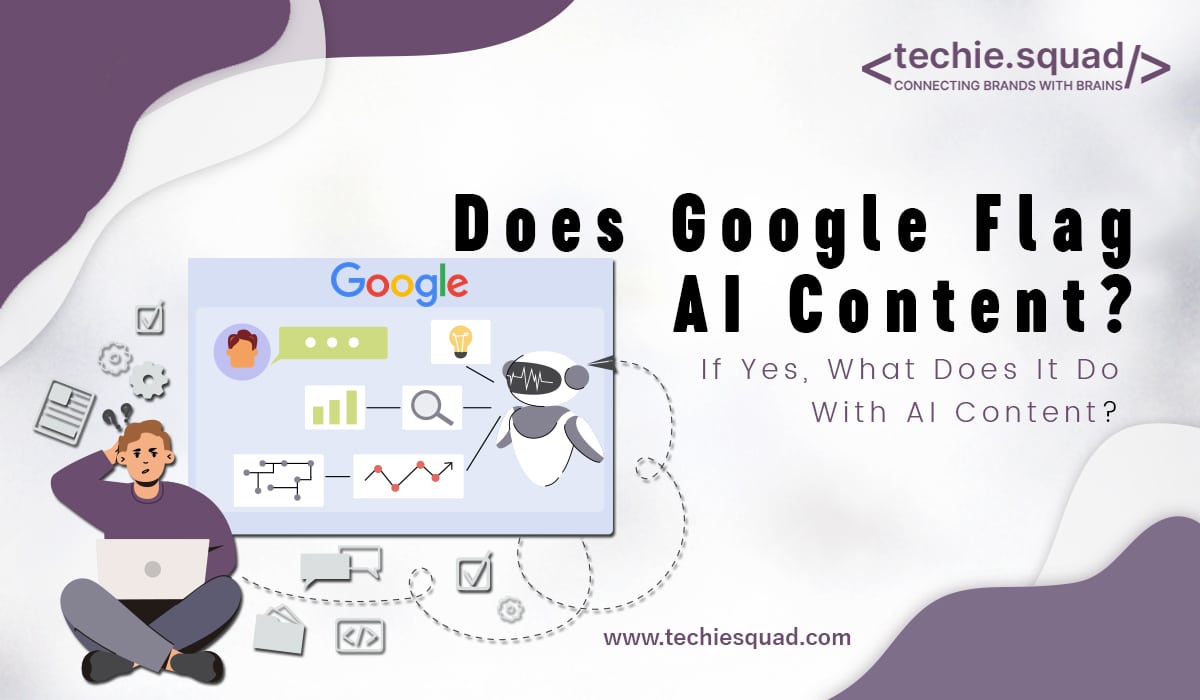Today, the buzz of AI is all over the world. It has transformed the way content was produced previously, making the content generation process more convenient. Nowadays, almost every digital marketing agency is leveraging AI regularly so that they can complete their work 10x faster.
Every day, tons and tons of content are generated using different AI tools and posted over the internet. These tools have made the content writing role much easier. Within a second, with its help, lengthy informational content can be generated.
Generating content at a 10x faster speed is good. But it’s extremely important to know what Google actually thinks about it. Does it flag AI content? This blog is fully dedicated to providing you with in-depth knowledge about Google’s opinion on AI-generated content. So stick with this blog till the end.
What is AI Content?
AI content is the digital information and material that is usually generated with the help of artificial intelligence technologies. Generating AI content is totally distinct from the creation of traditional content. Traditional content is created by human authors, while AI content is produced with the help of algorithms and machine-learning models.
The emergence of AI content has been a game-changer in various fields, such as journalism, marketing, and entertainment, offering the ability to produce large volumes of content rapidly and efficiently. However, it also raises questions about authenticity, copyright, and the ethical implications of machine-generated content.
Does Google Flag AI Content?
There is still a lot of confusion among individuals regarding Google’s AI content detection policy. However, Google claims that it can detect AI-generated content. Until recently, Google’s algorithm considered automatically generated content to be spam, so any AI content detected by the search engine was penalized accordingly.
In 2022, Google’s senior webmaster trends analyst John Mueller informed that AI content is automatically generated content, which is why it is against the Webmaster Guidelines.
But in 2023, all this changed. According to Google Search Central’s current guidelines, search engines now emphasize rewarding high-quality content, however it’s generated. In other words, digital marketing agencies no longer have to avoid Google detection when using AI content. Instead, they can concentrate on using AI writing tools to produce high-quality content that is relevant to their target audience’s needs.
Consequences of Flagged AI Content
When Google identifies AI-generated content that violates its guidelines, it may take various actions:
- Lowered Search Rankings: Flagged content may experience a decline in search rankings, diminishing its visibility to users.
- Penalties: In severe cases of content manipulation or spam, Google may impose manual penalties, resulting in removal from search results or deindexing.
- Algorithmic Adjustments: Google continually refines its algorithms to combat AI-generated spam and maintain the integrity of its search results.
The Google AI Content Update
Google’s algorithms are designed to prioritize high-quality, relevant content to provide users with the best possible search experience. Any kind of poor content or content fully prepared to keep search engines in mind wouldn’t be considered valuable content, whether it’s created with the help of AI or humans.
In response to the increase in AI-generated content, Google has implemented updates to maintain the integrity of its search results. The Google AI content update aims to distinguish between human-generated content and content produced by AI.
Understanding AI Content Detection
To identify AI-generated content, Google employs sophisticated algorithms and machine learning techniques. According to experts, search engines examine several factors to distinguish between AI and human content. Some of the key factors are:
- Language Patterns: To identify anomalies indicating AI involvement, Google analyzes language patterns and syntax.
- Contextual Understanding: To determine content authenticity, search engines evaluate the coherence and relevance of content.
- Metadata Analysis: To assess the credibility of content, Google examines metadata such as authorship information and publication history.
Strategies for Creating SEO-Friendly AI Content
Digital marketing agencies can navigate the complexities of AI-generated content by implementing the following strategies:
- Focus on Quality: Prioritize creating high-quality, relevant content that adds value to your target audience.
- Human Touch: Inject personality and authenticity into your content to resonate with readers and differentiate it from AI-generated material.
- Diversify Content Types: Incorporate a variety of content formats, including videos, infographics, and interactive elements, to enhance user engagement and appeal.
Conclusion
In the dynamic realm of digital marketing, staying abreast of Google’s guidelines on AI-generated content is critical. With this approach, agencies can avoid penalties and save their website’s ranking from downfall.
By embracing ethical AI practices and staying informed about industry trends, digital marketers can leverage AI technology to enhance their SEO strategies and drive sustainable growth for their clients.
The relationship between AI and digital marketing offers opportunities for innovation and growth. But remember to utilize AI in a manner that doesn’t violate Google’s guidelines.

